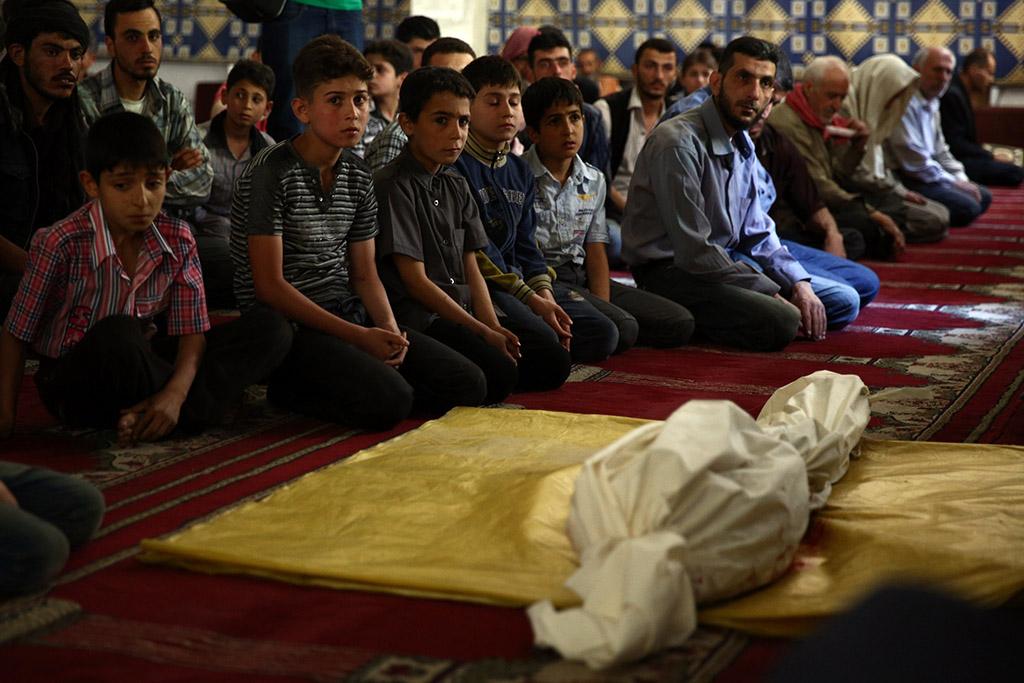OK, so there was a ground raid. But who’s winning the war?
Syrian children mourn next to the body of their friend, Malik, who was killed when a mortar shell landed in front of their school. The funeral is at a mosque in the rebel-held area of Douma, east of the capital Damascus, May 16, 2015.
Editor's note: This is Chatter, our morning rundown of what you need and want to know around the world. Fortunately for us all, you can have Chatter emailed to you every day. Just sign up here!
NEED TO KNOW:
There have been around 4,000 US-led airstrikes on Islamic State targets in Syria and Iraq, but ground raids? Not so much. Except for Friday night, when Obama authorized a raid on Al-Omar in east Syria, an attempt to capture senior Islamic State leader Abu Sayyaf and his wife Umm Sayyaf.
The raid was successful. US operatives killed 32 militants, including their target, Abu Sayyaf, a Tunisian who reportedly helped direct the group’s extensive oil and gas interests. "There was close quarters, hand-to-hand combat," said one US official. Abu Sayyaf's wife was taken captive and a young Yazidi woman that the couple apparently kept as a slave has been freed, according to a White House statement.
The ground raid was only the second of its kind in Syria — the first being a botched attempt to rescue US hostages, including reporter James Foley, who had written for GlobalPost. This raid was the result of months of intelligence gathering and surveillance on Abu Sayyaf's compound. The US says we can expect more "boots on the ground" in the weeks to come.
The attack is being touted as a serious blow to the Islamic State, but the truth is we don't really know what to make of it. Despite Abu Sayyaf's apparently high rank, the Islamic State's leadership structure remains opaque. It's hard to say who's winning overall. The Islamic State remains in control of major cities, such as Mosul in northern Iraq and Raqqah in northeastern Syria.
Last week, they overran government buildings in Ramadi, the capital of Iraq’s western Anbar province. Yesterday, they were said to be gaining ground near the historic city of Palmyra in Syria, though today the news is that Syrian troops have pushed them back in a battle that left dozens dead. But "boots on the ground" surely mark an escalation.
In other major news, deposed Egyptian president Mohamed Morsi was sentenced to death on Saturday for his role in a mass jailbreak during the 2011 uprising. More than 100 other defendants received the same sentence. Morsi, sitting in a caged dock in the blue uniform of convicts, raised his fists in defiance when the judge read out his verdict. Egypt's religious authorities will now have to give their opinion before the sentence can be carried out.
Morsi has already been sentenced to 20 years in jail for ordering the arrest and torture of protesters while in power. His Muslim Brotherhood supporters have described the charges against him as "farcical." The request for a death sentence has been condemned by Amnesty International and Turkish President Tayyip Erdogan.
WANT TO KNOW:
New footage continues to emerge of the devastation wrought by the magnitude-7.8 earthquake that killed more than 8,000 people in Nepal last month. The latest is this GoPro video of Mount Everest base camp the day after the disaster. It triggered an avalanche that killed at least 19 people at the camp, 17,600 feet above sea level, on the slopes of the world’s highest peak. Watch this video and take a guided tour of Everest’s devastated base camp.
And here's why Nepal’s needless earthquake deaths won’t be the last. Several major cities around the world are overdue a huge temblor. “Millions and millions more people are living in areas where significant earthquakes are anticipated,” warns Bruce Presgrave, a geophysicist at the US National Earthquake Information Center.
Lima, Istanbul and Tehran are high on the list. Yet few areas may be as ill-prepared as Villa El Salvador on the outskirts of Lima, Peru, where most buildings fail to comply with even the most basic seismic requirements. Inadequate building techniques were one reason so many died in the recent Nepal earthquakes. “We don’t know when,” said Hernando Tavera, earthquake unit director at the Geophysical Institute of Peru. “All we know is that every day that goes by without anything happening brings us a day closer to this major event.”
STRANGE BUT TRUE:
How hard is it to talk about your vagina in Egypt? Pretty hard, but that's not stopping Sondos Shabayek, director of the BuSSy project, a theater group that began as Egypt’s answer to Eve Ensler’s “Vagina Monologues.”
In March, the group was slated to perform at a state-run theater but was banned days before the performance. The theater director had asked them to modify the show, which addresses topics such as sex and masturbation. Shabayek and the performers refused. Undeterred, the theater group is now touring the country.
Meanwhile, everyone else in Egypt is obsessed with Bollywood. Think that's odd in a region known for latent racism against South Asians? Dig deeper and you find fans like Dalia, who is inspired by the racial and ethnic coexistence represented in many of the films and, by extension, India as a whole. “It’s a society that is so rich and so diverse yet they’re tolerant somewhat and they coexist, which is very hard to find here.”
Every day, reporters and producers at The World are hard at work bringing you human-centered news from across the globe. But we can’t do it without you. We need your support to ensure we can continue this work for another year.
Make a gift today, and you’ll help us unlock a matching gift of $67,000!
